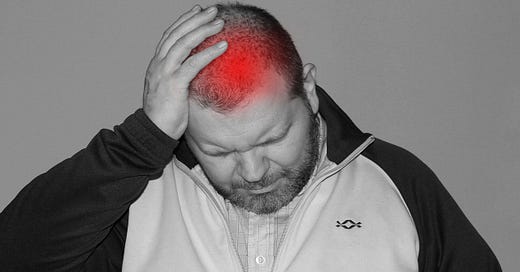Symptoms of Stress <-> Symptoms of Chronic Illness
Overlaps Between Chronic Stress and Chronic Diseases
Some years before my ultimate diagnosis, I went to the doctor about anxiety, depression, panic attacks, and obsessive compulsive behaviours. As well as being put on the obligatory anti-depressants [back then I had learned helplessness, and did what the doctors told me], the doctor also sent to me to a course called “Stress Control” which was being trialled in my local area at that time. This was a very helpful course, a least the reading material and self-reflective homework. As part of the course we got printed booklets and workbooks, authored by the course creator, Jim White.
Several years later, 6 or 7 years after my Idiopathic Parkinson’s Disease diagnosis, when I had finally begun to turn things around and take responsibility for my own health, research and study, and when I was moving back in with my parents, I rediscovered these booklets from the Stress Control course.
This is when the scales fell from my eyes.
The booklets contained an extensive list of symptoms of chronic stress. My jaw fell (further) open from what I was reading [folks with PD and other chronic diagnoses tend to be life long mouth breathers, and hence permanently have their mouths open - also connected to stress - one of the things I worked on fixing in myself: I am now a natural nose breather… just including this as an anecdote illustrating that contributing factors can indeed be fixed]. As I was reading through Jim’s list of stress symptoms, I realized that it also covered virtually all the major motor and non-motor symptoms of Parkinson’s!
While I had already figured out that acute stress dramatically impacts and aggravates the symptoms of PD, remember what I was reading in Jim’s work was nothing to do with Parkinson’s or chronic illness at all, it was simply in regards to chronic stress. Yet here he was describing most, if not all, of my symptoms!
It was this that ultimately set me on the path to realizing that PD is not just a stress-related disorder, it is indeed a manifestation of chronic stress itself. The Stress Control booklet’s eventually led me to Dr Stephen Porges’ Polyvagal Theory.
From there, the final piece of the jigsaw fell in to place: the freeze stress response. My complete picture of Idiopathic Parkinson’s was now simple: this is when humans get stuck in a freeze state due to chronic stress.
This then provided a blueprint for what to do about it, and a plan for how to recover.
Recently, I wanted to look up something in the booklets, but couldn’t find them. So I looked Jim White up and discovered that, in the meantime, he had published them as a formal book, called “Stress Control: A Mind, Body, Life Approach to Boosting Your Well-being”. I will do a full review of the book in due course.
However, the book does contain his “master list” of possible symptoms of stress, and I thought it would worth be sharing a selection of these, in case this helps the scales fall from the eyes of other folks with various chronic illness diagnosis, to help see these could also be largely be manifestations of chronic stress, and hence to bring back hope that all is not lost, and something can still be done to get rid of the symptoms and reduce suffering.
Some Symptoms of Stress by Jim White
[Note this is only a partial sample of Jim’s list, and even his full list Jim admits is not a complete one. Note also, that this is definitely not saying that everyone will get all of these symptoms. Chronic stress manifests very differently in each of us, resulting in our own personalized basket of symptoms “picked” from these lists. The diagnosis we eventually get from the doctors then depends on how closely the contents of our unique basket matches to a specific collection of symptoms which has been given a disease label, almost via a flowchart.]
Palpitations, rapid heart rate, chest pain;
loss of appetite or craving for food, weight loss or gain;
dizziness or faintness, headaches, tiredness;
flushing or chills, sweating;
muscles aches and pains, pins and needles, “jelly legs”, trembling, sluggishness;
“freezing”, shakiness;
chronic pain, joint pain;
tremors in voice, problem swallowing, speaking more slowly;
butterflies in stomach, bladder weakness, diarrhoea, constipation;
sleeping problems, can’t get to sleep, waking up in the night;
sexual problems, loss of libido;
loss of self-confidence, fear of challenges;
self-criticism or self-hatred;
feeling hopeless or worthless;
mind going blank, poor concentration;
worrying too much, feeling tense;
My therapist
also points us to another even more extensive source of possible symptoms of stress:50 Common Signs and Symptoms of Stress
[for anyone who wants help to pursue chronic symptom reduction via stress management, I cannot recommend working with Lilian highly enough, especially folks with a chronic illness diagnosis].








Stress burns up nutrients rapidly. Almost everyone lives in a "high stress" state, which is one more reason why, in my opinion, everyone needs to take supplements in order to enjoy optimum health. Also getting good sleep and meditating are very valuable in our modern world.
I believe that all things are inter related, good and bad. Everything we do sends out ripples in every direction. Are we the senders of good ripples or bad ones? Our choice.